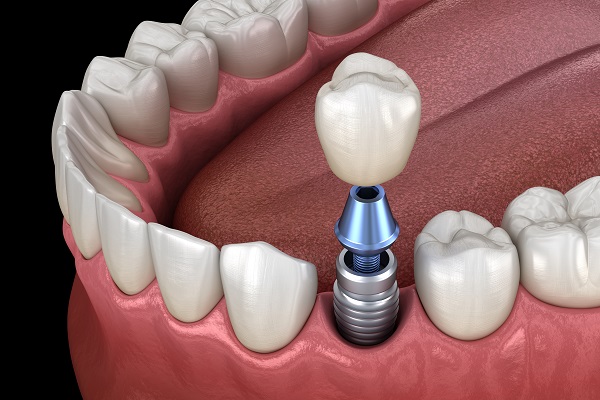Advice for Implant Crown Aftercare

The success of an implant crown has much to do with the recovery period. As you heal from the procedure, you need to take excellent care of the surgical site where the implant sits. These sections go over the different aspects of after-care after a dental implant procedure.
How a dentist fits an implant crown: A short description
Installing a dental implant and the restoration that it anchors requires at least one minor oral surgery. Depending on a patient’s situation, a dentist will oversee one or more of the following steps:
- A comprehensive dental exam will inform the dentist of the best way to restore the patient’s smile
- They will discuss different treatment options with the patient, detailing the pros and cons of each one
- If both dentist and patient agree on an implant-supported crown, the dentist will oversee a bone graft if the patient needs one
- The dentist will then take their patient through the fitting of a dental implant and connector
- The dentist will load the implant with a dental crown
Each step can be a standalone procedure, or the dentist can combine multiple procedures into one. In the case of same-day implant crowns, the dentist will complete the treatment in a single session. Each approach has its upsides and drawbacks, information that the dentist will present before they start treatment. Here is how the patient plays their part during the recovery period.
1. Oral hygiene during the recovery period
Good oral habits normally prevent bacteria from attacking the teeth and gums. The stakes are much higher when a person has a surgical site that needs to heal. Good oral hygiene goes a long way toward preventing infection after an implant crown procedure.
Brush the teeth very gently with lukewarm water and a soft toothbrush. The point is to avoid irritating the area that holds the dental implant. A saltwater rinse after brushing also helps, working to reduce swelling and speeding up the healing process. Dentists will send their patients home with detailed instructions on cleaning the mouth in the days following the procedure.
2. Diet during the recovery period
The goal is to be gentle with the section of gum that holds the dental implant. Prepare soft foods to eat, like pudding, mashed potatoes, and ground meat, that require minimal chewing. Remember to still choose healthy, nutritious foods that give the body what it needs to heal faster. The dentist will give the patient a list of meals to choose from.
3. Rest during the recovery period
The patient needs to keep the sutures at the surgical site intact, which means keeping activity to a minimum. Hold off on exercise for a week or two until the gums heal from the surgery. The same goes for chores and errands in the days after the procedure. It is a good idea to get vital activities out of the way before the procedure.
4. Pain management
The dentist will recommend home remedies and over-the-counter medication to help with discomfort. Popular home remedies include elevating the head during sleep, using ice packs, and doing periodic salt water rinses.
Dentists will also advise their patients on symptoms that point to post-procedure complications. They will ask their patients to seek medical help if they experience persistent bleeding, fever, or severe and persistent pain.
Dental care whenever you need it
Get in touch with us if you need an implant crown in New York. We offer a range of dental care services, including fitting dental implants to restore your smile.
Request an appointment here: https://www.newyorkdentaloffice.com or call New York Dental Office at (212) 548-3261 for an appointment in our New York office.
Check out what others are saying about our dental services on Yelp: Dental Restorations in New York, NY.
Recent Posts
Your dentist can provide a dental restoration that can restore your damaged tooth. A broken tooth can cause pain and discomfort. It can prevent you from eating, smiling, and speaking. Knowing what restorations are available can help you decide which one suits you the most. Here are the details about each dental restoration that can…
A dental restoration can stop the progress of dental problems from decay or injury. Dental fillings can treat mild to moderate cavities. Your dentist will assess your teeth and see how many need fillings. Here are the things to expect before you get this dental restoration.The dentist will examine the patient’s teeth and see how…
Dental restorations procedures repair damaged or decayed teeth and improve their appearance. Multiple restoration procedures are available today, each with unique benefits and drawbacks. The following article presents the various options for dental restoration procedures and which may be the most effective treatment option for you and your smile.Dental fillings are the most common type…
Aftercare and long-term care are vital for maintaining the results if you have recently undergone a dental restoration procedure. Maintaining the results does not have to be difficult; however, you must remain dedicated to caring for your new smile. Following the simple tips below will extend the life of your new dental work.No matter the…



